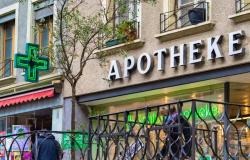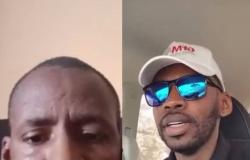“We were sleeping and suddenly we heard three or four missiles. The strike was so powerful that I thought the building was going to collapse on us,” added the 60-year-old man, who refused to give his name. family. “I felt as if it was my building that was being targeted,” says Samir, who lives opposite the site of the strike which left at least 20 dead and 66 injured, according to Lebanese authorities.
He fled in the middle of the night, with his wife and two children. “We saw two dead people lying on the ground, the children started to cry and their mother even more,” he continues. Residents of neighborhoods further from the capital, relatively spared from the Israeli strikes which are particularly targeting the southern suburbs, a stronghold of pro-Iranian Hezbollah, were startled awake by the explosions. Saturday morning in the Basta district, an acrid smell of powder permeates the air, mixing with the dust raised by excavators and rescuers who search through the rubble, in the middle of a landscape of desolation.
The strike flattened a building in a densely populated alley, leaving a deep crater, and all around were piles of stone and scrap metal, gutted buildings and blown out windows. The National News Agency (NAI) reported that the raid was carried out by “armor-piercing bombs” designed to destroy fortifications.
The Lebanese army blocks access to the site, while residents approach to ask for news. Unarmed Hezbollah militants monitor the area. A Lebanese security source claimed that a “senior Hezbollah official was targeted” by the raid – without being able to say whether he had died – but a Hezbollah MP, Amin Cherri, denied that a leader of the movement was targeted in Basta.
“It’s the first time I’ve woken up screaming in terror,” Salah, a 35-year-old resident of Basta, told AFP. “I don’t know how to express the fear I felt,” adds Salah, a father of two who also rushed outside while it was still dark. The same neighborhood was already the target of a strike for the first time on October 10, which targeted the head of Hezbollah’s security apparatus, Wafic Safa.
The latter survived, according to a security source, but the strike and another on the neighboring district of Noueiri left a total of 22 dead and 117 injured. Over the past week, four strikes have targeted the heart of Beirut, while raids on the southern suburbs, deserted by the majority of its inhabitants, are intensifying. On Saturday morning, new raids targeted the southern suburbs, after calls from the Israeli army, posted on social networks, to evacuate. The strike on Basta, however, was not preceded by a call to evacuate.
After a year of cross-border violence, Israel has been carrying out a campaign of intensive strikes since September 23, targeting in particular the southern suburbs, the south and the east of Lebanon. Since October 8, 2023, more than 3,670 people have been killed in Lebanon, according to the Ministry of Health, most since September 23. Like other working-class neighborhoods in Beirut, Basta has been welcoming displaced people from violently bombed areas since the start of the escalation. Samir decided to return to his apartment, damaged by Saturday’s strike. “Where could I go?” he asked.
All my relatives and brothers and sisters were displaced from the southern suburbs and southern Lebanon.”






